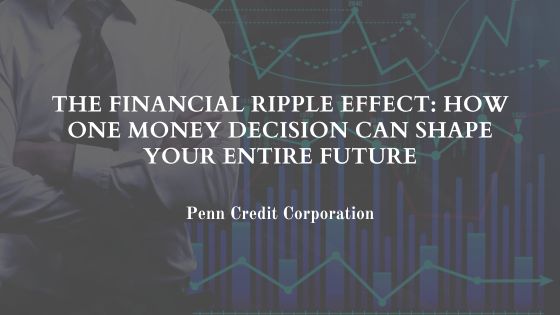Every financial choice you make sends ripples through your life. Whether it’s swiping your credit card, investing in a retirement account, or deciding to buy a home, each decision affects not only your present circumstances but also your long-term financial future. This interconnectedness is known as the financial ripple effect, a concept that highlights how even small actions can accumulate to create significant outcomes over time.
The Power of Small Decisions
Most people associate major financial milestones, such as buying a car, taking out a mortgage, or changing jobs, with their long-term impact. However, it’s often the smaller, everyday choices that shape financial outcomes the most. Choosing to eat out instead of cooking at home, skipping monthly savings contributions, or delaying bill payments may seem insignificant in the moment. Yet these small patterns can compound into habits that either build wealth or erode it.
For example, saving just $10 a day may not feel like much, but over a year, it amounts to $3,650. Invested consistently, that sum can grow substantially thanks to compound interest. Conversely, spending that same amount daily on non-essentials could prevent you from achieving financial goals like homeownership or early retirement.
The Long-Term Consequences of Short-Term Thinking
Short-term gratification is one of the biggest challenges in personal finance. Behavioral economists call this present bias, the tendency to prioritize immediate pleasure over future gain. It’s what makes credit card debt so common and emergency savings so rare. The problem arises when a short-term decision, like financing an expensive vacation, creates a long-term burden, such as years of interest payments.
By contrast, disciplined choices made today, like paying down debt, contributing to investments, or living below your means, can set off positive financial ripples that lead to greater stability and freedom in the future.
How to Create Positive Financial Ripples
Building a strong financial foundation doesn’t require radical change; it starts with consistent, mindful decisions. Begin by identifying areas where your spending doesn’t align with your values or goals. Then redirect those funds toward something that enhances your financial security, such as savings, investments, or education.
Automating good habits can also amplify positive ripples. Set up automatic transfers to your savings or retirement accounts so that you’re investing in your future without having to think about it. Over time, these systems compound both financially and psychologically, reinforcing responsible money management.
Awareness Is Everything
Recognizing the ripple effect encourages a more intentional approach to money. It reminds you that each financial decision, no matter how minor, contributes to your broader financial story. The awareness that today’s actions influence tomorrow’s opportunities can transform how you manage your resources.
Final Thoughts
Your financial future isn’t determined by a single moment but by a series of interconnected decisions. Each choice, like saving, spending, investing, or borrowing, sends ripples that shape the trajectory of your financial life. By becoming more aware of these ripples and intentionally directing them, you can build a future defined by stability, freedom, and long-term success rather than stress and uncertainty.
